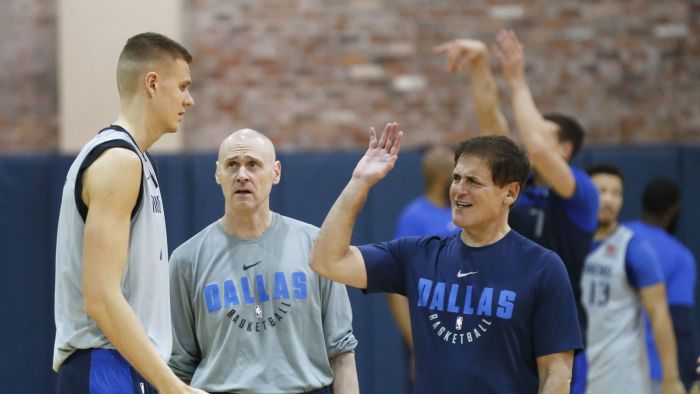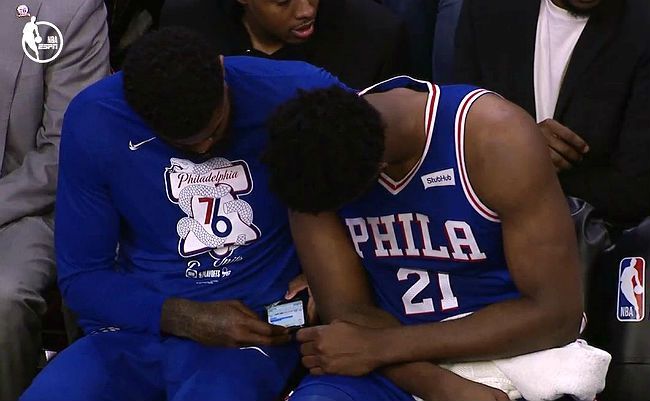Compared with the uneasiness and irritability of young players when faced with trades, veterans on the battlefield know better how to deal with their emotions when faced with trades. Brandon Bass, who has played in the NBA for 12 seasons, views trade rumors with a very indifferent attitude, " You can't control the future by thinking too much. Instead of worrying about it, it's better to let others worry about the business part, be a good basketball player, train and compete well, this is the attitude that a professional player should have."
After playing in the NBA for 14 years, Caron Butler believes that players usually have two states of mind when facing trades. The first is that they want to work hard to prove their value after moving to a new environment. "This kind of player has a strong psychological quality and knows how to use a positive mentality. Usually he will Have better performance, such as being traded from the Lakers to the NetsD'Angelo RussellThat's the best case. "The second type of players will fall into a state of self-destruction and think that since there is a risk of being traded, why should they care about the team's winning or losing? "This type of player will become a time bomb in the lounge and get fewer and fewer opportunities. To prove yourself, there is a high chance of becoming a Ronin player or falling out of the NBA."
The attitude of senior management determines the mood of the transaction


Most players believe that the attitude of the management before the transaction was the main reason for their emotions. "We hope to be open and honest, but lies and dishonest attitudes can easily lead to confrontation and conflict." Chauncey Billups, a sports commentator at ESPN, said, "Players The emotional ups and downs depend on the management's communication. Players need very simple, correct information, and our professional attitude can withstand being traded." Garrett Temple said, "But many general managers and front office staff always say one thing and do another. , this is unacceptable to us."
In the 2005-06 season, Knicks second-year player Mike Sweetney was traded to the Bulls without warning. Ironically, just a few days before the trade, the then Knicks general manager Isiah Thomas promised not to trade him. "I felt very sad at the moment. "I feel uncomfortable. The team is making nonsense of promises. I know this is a business and there will be no warning or discussion before the transaction occurs, but can't we honestly talk to the players?" Sweetney also lost confidence in himself and the NBA. He faded out of the NBA soon after.
Amare Stoudemire joined the Knicks in 2010 and reached a long-term cooperation commitment with the Knicks' top management. However, Stoudemire was frequently involved in trade rumors within a year. Although he tried not to let the rumors affect his game and mental state, the top management and coaches did not jump. Coming out to defend him, being put into such a situation made Stoudemire lose trust in the team. "I often wonder if it is worth my all-out since the team has broken its trust in me."
However, the management has a different idea. They believe that the NBA is a fast-changing and highly competitive market, and there is no such thing as correct information or complete loyalty. Jerry West, the current general manager of the Clippers, mentioned in an interview that the trade deadline is the period that most tests the team's psychological quality, but it also tests the foundation of mutual trust between the team and the players. "Many players believe that the team has commitment and loyalty. But this is a professional shopping mall, and everything is based on profit." An anonymous current manager said in an interview with HOOPSHYPE, "Unless you are likeKobe BryantOr an untouchable superstar like Tim Dunca, just accept the cruel reality of the NBA. This is a professional ball game, not an army that values loyalty. "
social media gossip


The one to two weeks before the trade deadline is like the playoffs for the media. All insiders, informants, contacts and sources must be mobilized to release news at the first sign of trouble. However, in the past, sources of information were confirmed in advance. The authenticity was not revealed until now, but now it is first posted on social media to confirm the authenticity of the news.
Social media has developed rapidly in recent years. Many rumors and gossips are spread on the Internet, and the habitual use of anonymous sources has created huge traffic and eyeballs for this group of media masters. However, on the contrary, fake news has spread everywhere. " None of the trading rumors posted by 90% on social media have happened. Only if your agent confirms it with you will it be true." Jared Dudley said, "Now social media has become a place where fake news adds fuel to the flames. Although I know most of them are not true, but I just can’t help but look at them, which ultimately leads to emotional fluctuations,” said Isaiah Thomas.
In recent years, he has been involved in many trading rumors.Dwight HowardNow, as long as the trade deadline is up, I will temporarily stay away from social media. "Everything on the Internet will shake people's hearts. Temporarily not looking at Twitter is the best way to cultivate the body and mind." Jae Crowder, who has experienced two transactions in the past three quarters, believes that Social media can easily affect emotions. "As long as I see rumors about my trading on Twitter, I will be so worried that I can't sleep. I can only keep asking my agent about the real situation, which will also affect my performance."